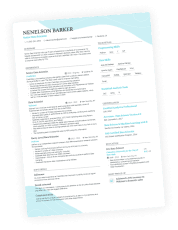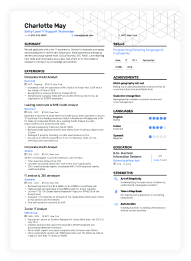Data Modelling Skills: Example Usage on Resumes, Skill Set & Top Keywords in 2024
Including data modeling as a skill on your resume suggests to recruiters that you have a strong ability for structuring and analyzing data, highlighting your analytical prowess. Dive into the guide below to discover how to effectively showcase your skills on your resume and explore your skillset's diverse applications.


Is your resume ATS-friendly?
Drop your resume here or upload a file to find out if the skills in your resume are readable by an ATS.
Data modeling is a skill that involves creating diagrams and using tools to organize and plan how data is stored and managed in systems like databases. It's a way of mapping out the relationships between different pieces of information, which helps in building efficient databases and helps systems to quickly and easily find the data they need. On your resume, displaying data modeling as a skill can signal to employers that you are capable of handling data structures and have a strong understanding of how to organize information effectively.
However, listing data modeling on your resume without the right experience or context might not always be beneficial. If you're applying for a position that isn't heavily reliant on data organization or if you lack substantial experience in this area, it might not add significant value to your resume. Instead of just adding this skill, it could be more beneficial to provide evidence of how you have applied data modeling in real-world projects or to highlight how it complemented your role in past positions.
In this article, you will learn:
- How data modeling on your resume can make you a more attractive candidate for certain jobs.
- The potential downsides of including data modeling on your resume if it's not relevant to the position you're applying for.
- Suggested ways of showcasing your data modeling expertise effectively on your resume.
Misusage of data modelling on resumes
Data modeling skills are essential for professionals in data-related fields, displaying an ability to create abstract models that represent real-world processes. However, overstating or misrepresenting these skills can lead to questions about your integrity and competence. Whether in the summary, experience, or achievements sections of your resume, accuracy and honesty serve as the foundation for earning trust and respect from potential employers.
- In the summary section: “Expert in data modeling with years of experience,” when you have only a basic understanding of data modeling principles.
- Within the experience section: Listing “Led data modeling for a multi-million-dollar project,” when your actual role was limited to data entry, not leading the modeling efforts.
- For the achievements section: Claiming “Revolutionized company data practices through innovative data modeling,” without any measurable results or specific contributions you made to the data modeling process.
How to demonstrate data modelling skills on your resume
- Showcase completed projects that involved creating and refining data models, emphasizing problem-solving skills and the successful use of data modelling to drive insights and decisions.
- Include specific data modelling methodologies you’re proficient in, like ER diagrams, UML or dimensional modeling, and mention the tools you’ve worked with, such as ERwin, Microsoft SQL Server, or Oracle Data Modeler.
- Highlight your understanding of different database systems and their respective data modeling languages (e.g., SQL for relational databases, NoSQL for document stores, etc.), demonstrating your versatility in handling various data storage scenarios.
- List relevant certifications or training you’ve completed that focus on data modeling, such as IBM’s Data Science Professional Certificate or courses on data warehousing and business intelligence.
- Provide quantifiable achievements that resulted from your data models, such as improving report performance by a certain percentage, reducing data processing times, or contributing to revenue growth through better-targeted data insights.
Example 1: Demonstrate data modelling in the experience section
- •Led a team of 5 engineers in developing a scalable e-commerce platform, increasing customer transactions by 30% within the first year.
- •Architected and implemented a cloud-based microservices solution which reduced server costs by 25%, improving profit margins.
- •Pioneered a cross-platform mobile application that boosted user engagement by 40%, and enhanced overall user experience.
- •Analyzed user behavior and sales data, which led to revamping the product line-up, resulting in a 20% increase in quarterly revenue.
- •Initiated and directed a predictive analytics project that reduced operational costs by 15%, increasing the company's overall efficiency.
- •Collaborated with cross-functional teams to design and launch a customer loyalty program that attracted 10,000 new sign-ups in three months.
- •Oversaw the launch of three major product lines that dominated the market, capturing a 15% market share in their respective categories.
- •Implemented agile methodologies to streamline product development, reducing time-to-market for new features by 20%.
- •Conducted extensive market research to inform product improvements, which played a crucial role in increasing customer satisfaction scores by 35%.
- Show measurable achievements, like increased transactions or reduced costs, to display your impact on past projects.
- Include projects across various roles, highlighting both leadership and collaboration to present a well-rounded history of your work.
- Use clear and straightforward language that translates your technical experience into business outcomes for easy understanding.
- Present a detailed breakdown of dates, without being vague, to establish when you achieved each accomplishment.
- Avoid repetition by sharing different aspects of your expertise in each bullet point to add depth to your experience.
- Remember, specifics are key; point out the exact outcomes and benefits your work provided to the business.
Example 2: Demonstrate data modelling in the summary section
- Highlights substantial experience which demonstrates capability and consistency.
- Specifies technical skills such as Python and SQL, which are desirable in many technical fields.
- Includes a quantifiable achievement (20% efficiency increase) that conveys the applicant's impact on previous employers.
- Expresses a passion for the job by mentioning a commitment to learning and quality results, hinting at a good work ethic and dedication.
- The narrative is clear, making the candidate's value proposition understandable to potential employers.
- Avoids overused terms and phrases, thus maintaining authenticity in presenting the applicant's abilities and accomplishments.
Example 3: Demonstrate data modelling in the achievements section
- The section clearly displays measurable results, using specific numbers to convey the candidate's impact.
- Titles are concise and action-focused, easily giving an overview of the candidate's capabilities.
- Descriptions provide context about the work done, showing the practical application of skills without relying on industry jargon.
- Each entry covers a different area of expertise, showcasing a range of skills and adaptability.
- The content focuses on real-work scenarios, making it relevant and relatable to potential employers.
Relevant certifications for data modelling skills on a resume
Explore these certifications to sharpen your data modelling expertise and advance your career.
The top 5 certifications for gaining data modelling skills expertise:
This certification demonstrates a comprehensive understanding of data management principles, including data modelling, and is beneficial for establishing credibility in the field.
This course covers the fundamental concepts of data modelling and prepares you for the practical application of designing and maintaining databases.
Though broad in scope, this certification includes modules on data science and data assets, which will help you develop and hone your data modelling skills.
Focused on data analytics, this certification enables you to comprehend and tackle the vast array of data, enhancing your data modelling capabilities in analytics projects.
Targeting cloud data services, this certification offers insights on working with Azure to build and deploy data models, providing a competitive edge in cloud data management.
Top skills people add together with data modelling skill on resume:
Database Management
SQL
ETL (Extract, Transform, Load)
Data Analysis
Business Intelligence
Data Warehousing
Big Data Technologies
Machine Learning
Data Visualization
Statistical Analysis
Analytical Thinking
Problem-Solving
Attention to Detail
Communication
Teamwork
Adaptability
Time Management
Critical Thinking
Persistence
Proactivity
Continuous Learning
Most relevant jobs for data modelling skills
Data modeling skills are crucial for professionals in fields that involve the organization, analysis, and interpretation of data to inform business decisions, improve performance, or understand complex systems. These skills enable workers to create abstract models that simplify data structures, making them easier to understand and work with. Here's a list of jobs where these skills are highly valued:
- Data Analyst
- Data Scientist
- Business Analyst
- Database Administrator
- Data Engineer
- Data Architect
- Business Intelligence (BI) Developer
- Machine Learning Engineer
- Systems Analyst
- Enterprise Architect
Key takeaways
- Data modeling is a valuable skill for your resume as it demonstrates your ability to structure and analyze data effectively.
- Avoiding misuse of data modeling involves understanding its applications and limitations.
- Showcase your data modeling expertise on your resume by providing examples of previous work and specific results achieved.
Make one that's truly you.




